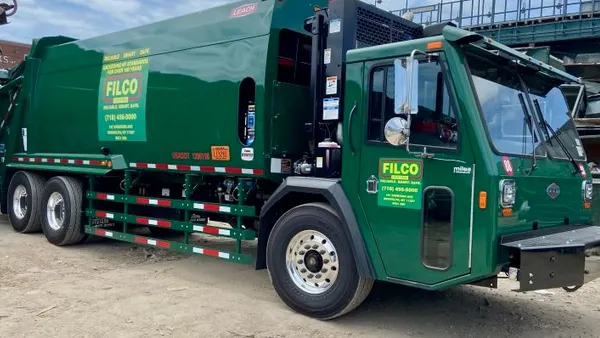UPDATE: Nov. 6, 2019: Residents in St. Paul, Minnesota decided to keep the city's organized collection ordinance by a wide margin, with 62.5% voting yes on Question 1 in yesterday's election.
Dive Brief:
- St. Paul, Minnesota's organized collection contract will live on no matter the outcome of a November ballot referendum. "[W]hatever the result of the referendum, the City’s contract obligations are not impaired. The City is contractually obligated to allow St. Paul Haulers the exclusive right to provide waste collection services," wrote Minnesota Supreme Court Chief Justice Lorie Gildea in a new opinion.
- While the justices had already decided to allow the referendum to proceed in an August ruling, affirming a lower court's decision, this new opinion provides further context. The contract will stand, because Minnesota law requires cities to arrange for waste service, but a foundational ordinance that establishes billing and collection protocols can still be challenged.
- "If voters repeal the ordinance, the $27.1 million annual cost of the contract will shift from individual ratepayers to all property tax payers in the city, resulting in a 17.4% increase in the city’s property tax levy," said Mayor Melvin Carter at a press conference yesterday, as reported by FOX 9.
Dive Insight:
The Minnesota capital's organized collection system for residential waste (at buildings with four households or less) took effect in October 2018 as part of a five-year contract signed with a consortium of 15 companies known as St. Paul Haulers. The list of remaining haulers has since shrunk to six – including Waste Management, Republic Services and Advanced Disposal Services.
Residents have complained about paying higher rates and no longer having the ability to share bins, among other issues. Service had previously been handled on an open market basis with contracts between haulers and individual households. Supporters say the new system reduces vehicle emissions with more efficient routing and reduces illegal dumping.
The city signed a contract with the consortium in 2017, but the issue at hand centers around an ordinance passed in August 2018. Ordinance 18-39, which created the regulations behind the system serving an estimated 73,485 households, is specifically what opponents have been trying to repeal since last year. While the St. Paul City Council initially declined to recognize their ballot petition in 2018, a recent series of court decisions have made it unavoidable.
Yet, as is often the case when such complicated arrangements go to court, the outcome hasn't exactly been clear-cut. St. Paul's argument that a referendum would interfere with its state-mandated requirement to arrange for service via "appropriate local control" didn't pan out, in part because the court identified other existing local ordinances related to waste collection. Opponents had hoped repealing the ordinance could effectively dismantle the system, potentially by triggering the contract's force majeure clause, but the court disagreed with that as well.
"The outcome of a referendum on an ordinance that establishes waste collection will not terminate the contract and does not rise to the level of a constitutional impairment of a contractual obligation," wrote Gildea in the opinion.
Now, voters are left to decide whether they are willing to potentially trigger a universal tax increase that would include properties not covered by the collection system. Opponents maintain it could still be possible to renegotiate terms with the haulers and avoid that outcome. St. Paul's election is Nov. 5.









